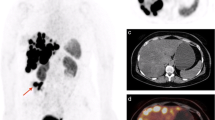Abstract
Purpose
The National Cancer Institute is the only referral centre in Malaysia that provides 68Ga-DOTA-peptide imaging. The purpose of this study is to determine the impact of 68Ga-DOTA-peptide PET/CT on the management of gastrointestinal neuroendocrine tumours (GI-NET).
Materials and Methods
A cross-sectional study was performed to review the impact of 68Ga-DOTA-peptide (68Ga-DOTATATE or 68Ga-DOTATOC) PET/CT on patients with biopsy-proven GI-NET between January 2011 and December 2015. Suspected NET was excluded. Demographic data, tumoral characteristics, change of disease stage, pre-PET intended management and post-PET management were evaluated.
Results
Over a 5-year period, 82 studies of 68Ga-DOTA-peptide PET/CT were performed on 44 GI-NET patients. The most common primary site was the rectum (50.0%) followed by the small bowel, stomach and colon. Using WHO 2010 grading, 40.9% of patients had low-grade (G1) tumour, 22.7% intermediate (G2) and 4.5% high (G3). Of ten patients scheduled for pre-operative staging, 68Ga-DOTA-peptide PET/CT only led to therapeutic change in three patients. Furthermore, false-negative results of 68Ga-DOTA-peptide PET/CT were reported in one patient after surgical confirmation. However, therapeutic changes were seen in 20/36 patients (55.6%) scheduled for post-surgical restaging or assessment of somatostatin analogue (SSA) eligibility. When 68Ga-DOTA-peptide PET/CT was used for monitoring disease progress during systemic treatment (sandostatin, chemotherapy, everolimus and PRRT) in metastatic disease, impact on management modification was seen in 19/36 patients (52.8%), of which 84.2% had inter-modality change (switch to everolimus, chemotherapy or PRRT) and 15.8% had intra-modality change (increased SSA dosage).
Conclusions
68Ga-DOTA-peptide PET/CT has a significant impact on management decisions in GI-NET patients as it can provide additional information on occult metastasis/equivocal lesions and supply the clinician an opportunity to select patients for targeted therapy.

Similar content being viewed by others
References
Reubi JC, Waser B. Concomitant expression of several peptide receptors in neuroendocrine tumors: molecular basis for in vivo multireceptor tumour targeting. Eur J Nucl Med Mol Imaging. 2003;30:781–93.
Kulkarni HR, Baum RP. Theranostics with Ga-68 somatostatin receptor PET/CT: monitoring response to peptide receptor radionuclide therapy. PET Clin. 2014;9:91–7.
Kulkarni HR, Baum RP. Patient selection for personalized peptide receptor radionuclide therapy using Ga-68 somatostatin receptor PET/CT. PET Clin. 2014;9:83–90.
Deppen SA, Liu E, Blume JD, et al. Safety and efficacy of 68Ga DOTATATE PET/CT for diagnosis, staging, and treatment management of neuroendocrine tumors. J Nucl Med. 2016;57:708–14.
Antunes P, Ginj M, Zhang H, Waser B, Baum RP, Reubi JC, et al. Are radiogallium-labelled DOTA-conjugated somatostatin analogues superior to those labelled with other radiometals? Eur J Nucl Med Mol Imaging. 2007;34:982–93.
Ambrosini V, et al. 68Ga-labelled peptides for diagnosis of gastroenteropancreatic NET. Eur J Nucl Med Mol Imaging. 2012;39:S52–60.
Buchmann I, Henze M, Engelbrecht S, Eisenhut M, Runz A, Schäfer M, et al. Comparison of 68Ga-DOTATOC PET and 111In-DTPAOC (Octreoscan) SPECT in patients with neuroendocrine tumours. Eur J Nucl Med Mol Imaging. 2007;34:1617–26.
Krausz Y, Freedman N, Rubinstein R, Lavie E, Orevi M, Tshori S, et al. 68Ga-DOTA-NOC PET/CT imaging of neuroendocrine tumors: comparison with 111In-DTPA-octreotide (OctreoScan®). Mol Imaging Biol. 2011;13:583–93.
Naswa N, Sharma P, Kumar A, Nazar AH, Kumar R, Chumber S, et al. Gallium-68-DOTA-NOC PET/CT of patients with gastroenteropancreatic neuroendocrine tumors: a prospective single-center study. AJR Am J Roentgenol. 2011;197:1221–8.
Hofman MS, Kong G, Neels OC, Eu P, Hong E, Hicks RJ. High management impact of Ga-68 DOTATATE (GaTate) PET/CT for imaging neuroendocrine and other somatostatin expressing tumours. J Med Imaging Radiat Oncol. 2012;56:40–7.
Ambrosini V, Campana D, Bodei L, et al. 68Ga-DOTANOC PET/CT clinical impact in patients with neuroendocrine tumors. J Nucl Med. 2010;51:669–73.
Herrmann K, Czernin J, Wolin EM, et al. Impact of 68Ga-DOTATATE PET/CT on the management of neuroendocrine tumors: the referring physician's perspective. J Nucl Med. 2015;56:70–5.
Skoura E, Michopoulou S, Mohmaduvesh M, et al. The impact of 68Ga-DOTATATE PET/CT imaging on management of patients with neuroendocrine tumors: experience from a National Referral Center in the United Kingdom. J Nucl Med. 2016;57:34–40.
Kratochwil C, Stefanova M, Mavriopoulou E, et al. SUV of [68Ga]DOTATOC-PET/CT predicts response probability of PRRT in neuroendocrine tumors. Mol Imaging Biol. 2015;17:313–8.
Kayani I, Bomanji JB, Groves A, Conway G, Gacinovic S, Win T, et al. Functional imaging of neuroendocrine tumors with combined PET/CT using 68Ga-DOTATATE (DOTA-DPhe1,Tyr3-octreotate) and 18F-FDG. Cancer. 2008;112(11):2447–55.
Oh S, Prasad V, Lee DS, Baum RP. Effect of peptide receptor radionuclide therapy on Somatostatin receptor status and glucose metabolism in neuroendocrine tumors: Intraindividual comparison of Ga-68 DOTANOC PET/CT and F-18 FDG PET/CT. Int J Mol Imaging. 2011;2011
Gabriel M, Oberaurl A, Dobrozemskyl G, et al. 68Ga-DOTA-Tyr3-octreotide PET for assessing response to somatostatin-receptor-mediated radionuclide therapy. J Nucl Med. 2009;50:1427–34.
Garcia-Carbonero R, et al. Imaging approaches to assess the therapeutic response of gastroenteropancreatic neuroendocrine tumors (GEP-NETs): current perspectives and future trends of an exciting field in development. Cancer Metastasis Rev. 2015;34:823–42.
Acknowledgments
We are grateful to Dr. Asmayani Khalib and all our staff for their assistance in this study. We also thank the Director General of the Ministry of Health of Malaysia for permission to publish this paper.
Author information
Authors and Affiliations
Corresponding author
Ethics declarations
Conflicts of Interest
Teik Hin Tan, Ching Yee Boey and Boon Nang Lee declare that they have no conflicts of interest.
Ethics Statement
Informed consent was obtained from all patients for being included in the study. This study is approved by the local ethics committee.
Ethics Approval
All procedures performed in studies were in accordance with the ethical standards of the national Medical Research and Ethics Committee and with the 1964 Helsinki Declaration and its later amendments or comparable ethical standards.
Informed Consent
This retrospective study was approved by the national ethics committee, and the requirement to obtain informed consent was waived.
Rights and permissions
About this article
Cite this article
Tan, T.H., Boey, C.Y. & Lee, B.N. Impact of 68Ga-DOTA-Peptide PET/CT on the Management of Gastrointestinal Neuroendocrine Tumour (GI-NET): Malaysian National Referral Centre Experience. Nucl Med Mol Imaging 52, 119–124 (2018). https://doi.org/10.1007/s13139-017-0496-3
Received:
Revised:
Accepted:
Published:
Issue Date:
DOI: https://doi.org/10.1007/s13139-017-0496-3




